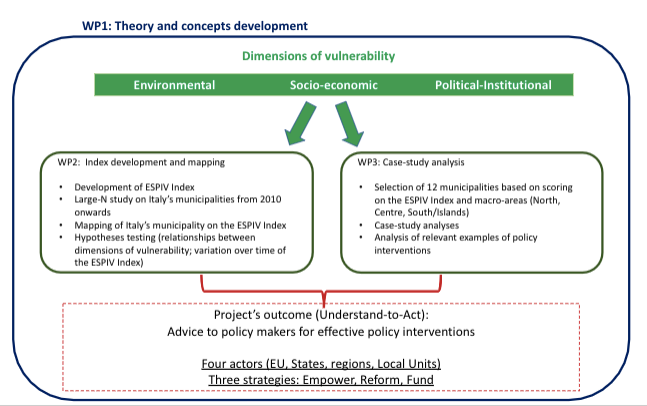UNVEIL proposes a theoretically grounded, encompassing conceptualization of the vulnerability and resilience of territories.
In particular, it unpacks the concept of vulnerability and resilience in three dimensions:
the Enviromental, the Socio-Economic, and the Political-institutional dimensions
and it advances their empirical measurement.
What:
UNVEIL foregrounds Italian municipalities, which correspond to Eurostat’s classification of Local Administrative Units (LAU2). UNVEIL relates formally comparable territories, which nonetheless largely differ in several respects. Hence, despite the focus on a single country (Italy), the number of municipalities covered offers enough variation in terms of key dimensions -different levels of socio-economic development, inner (or peripheral) vs. central areas, rural vs. urban.
When:
Data are collected from 2010 onwards. This time frame covers at least two Italian municipal elections and includes the 2010 European sovereign debt crisis, the 2015 migration crisis, and the 2020 COVID-19 outbreak, all of which have produced detrimental effects on municipalities.
How:
UNVEIL relies on a combination of qualitative and quantitative methods, as well as comparative analysis, to develop theory and collect and analyze data on vulnerability.
Why:
UNVEIL develops “place-based knowledge” to make policymaking effective.
The UNVEIL research activities consist of three pillars to be developed in three Work Packages:
|
WP1 WP1 aims to conduct a systematic interdisciplinary literature review on the concept and measurements of vulnerability and resilience. Such a review will be complemented with political science’s literature on the efficiency and quality of local institutions and political elites, as well as on the professionalization and personalization of local political actors.
|
WP2 WP2 will measure vulnerability and resilience across territories. This will allow UNVEIL to evaluate the intensity of the Environmental, Socio-economic, and the newly introduced Political-Institutional vulnerabilities of each territory through the construction of a multidimensional index of vulnerability and resilience (ESPIVaR Index). This index will be adapted to each different exogenous challenge (Climate change, Economic crisis, Health emergency). |
WP3 WP3 provides qualitative case studies analysis to thoroughly investigate the impact of policy actions on local units according to their degree and types of vulnerability. UNVEIL implies a dialogue with local, regional, and higher-level stakeholders to advance proposals on the kind of tailored interventions required to make policy-making effective. |


